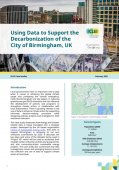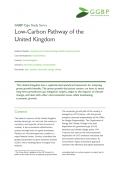The experience of the UK’s Climate Change Act provides lessons for climate law-making that apply internationally. A comprehensive framework law is an essential tool for coordinating action to reduce greenhouse gas emissions and increase resilience. A good climate law contains statutory targets, assigns clear duties and responsibilities and provides clarity about the long-term direction of travel. Economy-wide, multi-year targets, set well in advance, help to define a clear yet flexible path towards the long-term climate objective. A strong independent body is critically important to ensure consistent policy delivery and evidence-based decision-making. In the UK the introduction of the Act and its carbon budgets has helped to reduce emissions, particularly in the power sector, while the economy has continued to grow.
This report, 10 years of the UK Climate Change Act, explores what procedural, institutional and legislative arrangements have been successful. The report asks what political challenges to the Act might arise in the future. The assessment is based on interviews with civil servants, special advisers, government and shadow ministers, backbench Members of Parliament, policy commentators and industry representatives. Their responses are complemented with insights from the literature, the authors’ own experience in engaging with UK climate policy, and conversations with experts in UK policy and in climate change governance.




